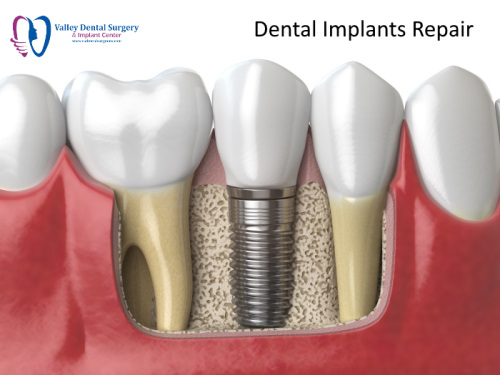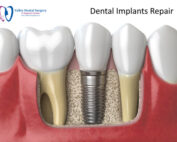Dental Implant Repair
When a dental implant malfunctions, a procedure called dental implant repair is performed, dental implants that fail may result from a bad implant or site, peri-implantitis, a lack of jawbone bulk, nerve or tissue damage, or infection. Nonetheless, your dentist can still repair your failed dental implant by diagnosing the underlying cause using x-rays and comprehensive digital images. Once this is determined, your dentist can choose the most effective action.
How Is a Failing Dental Implant Treated?
Peri-implantitis-induced implant failure is often addressed by sterilizing the implant site and removing contaminated tissue. Before your dentist can repair a failed dental implant due to inadequate jawbone mass, you will require a bone graft. In locations where bone loss has occurred, a bone transplant can assist in augmenting the volume and density of the jawbone.
Can a Dental Implant That Has Broken Be Repaired?
Yes, a damaged or defective dental implant may be fixed. A skilled dentist must use a specialized composite material to do all essential repairs on a dental implant that has been chipped. However, if the extent of the damage is severe, it may be necessary to replace the entire dental implant. Before placing a new dental implant, you may need a bone transplant to strengthen your jawbone and guarantee enough density.
What Are the Symptoms of Dental Implant Failure?
There are five common symptoms associated with dental implant failure.
- Severe pain or discomfort
- Gum recession around the implant
- Chewing or biting difficulties
- Loose implant
- Inflamed gums
An x-ray will allow the dentist to determine the reason for the implant failure. After diagnosing the problem, the appropriate treatment for dental implant repair will be established.
What Factors Lead to the Dental Implant Failure?
Retrospective research published in the Journal of Oral Medicine and Oral Surgery discovered that the failure rate for dental implant surgery is 3.11 percent. Surgical stress, infection, inadequate jawbone mass, sinus issues, and a lack of primary stability are the most prevalent reasons for early implant failure. In contrast, the most pervasive reasons for dental implant failure after 10 years include peri-implantitis, occlusal overload, nerve or tissue injury, and failed osseointegration.
Failed Implant to Bone Bond
Osseointegration is the bonding of the dental implant post to the jawbone. Often, revised treatment plans inhibit early osseointegration between the implant surface and the surrounding bone, resulting in failed osseointegration. Other typical causes of unsuccessful osseointegration include infection, inappropriate implant placement, implants made of low-quality materials, trauma during or after surgery, inadequate healing, early loading, and allergic rejection of foreign things by the body.
Insufficient Bone Density
Bone health and enough bone mass significantly impact the success rate of dental implant surgery. A lack of jawbone density might cause the implant to become loose, failing the dental implant. Before the operation, your implant dentist will check the condition of your bone. If there is inadequate bone, a bone transplant or sinus lift might be performed before implant insertion. Bone grafting is a surgical procedure using a patient’s bone to increase bone density.
Infection
An infection causes most dental implant failures at the implant site. Peri-implantitis is a bacterial infection characterized by inflammation of the peri-implant mucosa and gradual loss of the bone that supports the implant. It is caused by bacterial development immediately beneath the gum line near the dental implant. The treatment of an infection will depend on its severity and location. For instance, antibiotics or soft tissue grafts may be required to treat a bacterial gum infection. A bacterial infection of the bone may need the removal of the implant and any damaged bone tissue, followed by a transplant of bone and soft tissue.
Peri-implantitis Symptoms
Peri-implantitis is an inflammatory condition that can cause the jawbone around the dental implant to break down over time. The symptoms of peri-implantitis are listed below.
- Pain near where the dental implant was placed
- Inflammation of the lymph nodes
- Pus coming out of the tissues around the implant
- Bad taste in the mouth
- Bleeding at the gum line
- Minor shifting or loosening of your dental implant
- Deep gum pockets around the implant
- Exposure and visibility of the implant threads underneath
Nerve or Tissue Damage
An oral surgeon may inadvertently put a dental implant too close to a nerve on occasion. As a result, your face, tongue, lips, and gums may become numb, tingly, or uncomfortable. You must pay attention to this since it may impair your ability to eat and drink regularly. When you have numbness or discomfort, you should see your dentist immediately since a nerve or tissue condition must be handled immediately.
Sinus Problems
The inflammatory byproducts of acute sinusitis can damage bone graft material’s osteoconduction and bone remodeling, as well as the osseointegration of dental implants, resulting in dental implant failure. A perforated sinus can cause implant failure. Whistling noises when breathing, nasal pressure, breathing difficulty, loss of smell, and bloody discharge are all symptoms of a ruptured sinus following a dental implant. One or two-millimeter holes are OK, but several-millimeter perforations commonly result in chronic problems. Some people who have suffered sinus perforation after a dental implant endure chronic nasal difficulties, needing crown removal, bone grafting, site healing, and another implant implantation.
Post-op soreness is normal after obtaining dental implants and should go away in 3 to 5 days. However, in certain situations, you may endure persistent or increasing discomfort for weeks following dental implant surgery. Consult your oral surgeon or dentist if you have pain from your dental implants since this might suggest a problem.
How Is a Broken Dental Implant Crown Fixed?
An artificial tooth mounted on a dental implant receives the same durability and strength as a natural tooth, thanks to a dental implant crown. However, chewing ice, eating hard sweets, and biting your fingernails can all lead to an implant crown breaking, chipping, or cracking. Impressions of the mouth will be made and sent to the dental lab if the crown fractures or breaks. With this help, a brand-new crown will be made to replace the previously destroyed one.
How Is a Broken Dental Implant Abutment Repaired?
A metal connector connected to your dental implant is called an abutment. The abutment firmly secures the dental implant crown in place. When an abutment experiences significant wear and strain, it may break. Your dentist will only need to fix the abutment and not the implant if the abutment is broken.
What Is the Success Rate for a Dental Implant?
According to research published in the International Journal of Implant Dentistry, the success rate of implant insertion is 90–95%. The surgical placement of dental implants is successful for four significant reasons. These include the dentist’s skill, good oral and general health, high-quality dental implant materials, the lack of periodontal diseases and major medical disorders, and the absence of these illnesses.
How Are Complications With Dental Implants Prevented?
Dental implant issues can be prevented if you adhere to your dentist’s recovery recommendations to promote healing. Additionally, you must attend your follow-up appointments so your dentist can assess how well your treatment is progressing. You must maintain your normal oral hygiene if you want to prevent issues with your dental implant. Additionally, if you smoke, you must stop because it will only hinder your recovery.
Dr. Hani Jamah at Valley Dental Surgery & Implant Center has over 22 years of experience in dental implant surgery since 1999. Make an appointment with Dr. Jamah so that he can identify the cause of the implant failure and determine the best treatment for dental implant repair for you.




